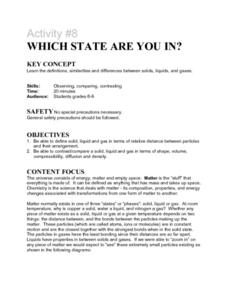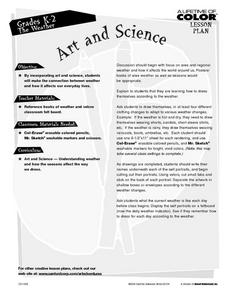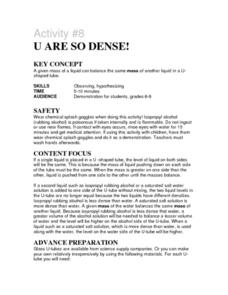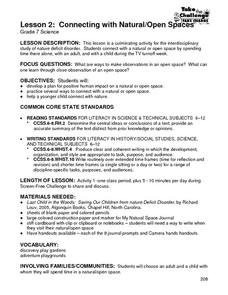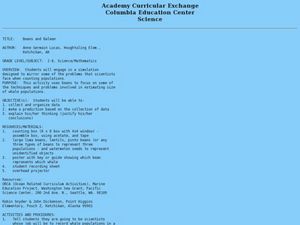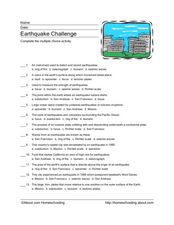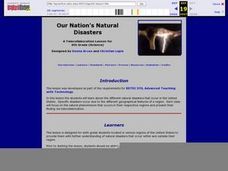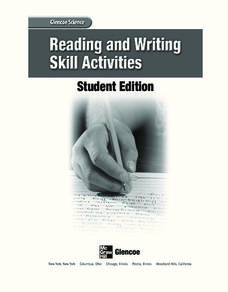Curated OER
On the Road Again
Students trace the migration route of a gray whale. They color and label a map of North America, and using photocopy pictures of a gray whale, they move the whale along the migration route over a ten week period.
Curated OER
The Nature and Science of Technology
Fifth graders practice using the scientific method by observing and creating mold. In this bacteria lesson, 5th graders experiment creating their own mold and fungus using petri dishes and oatmeal. Students create an information table...
Curated OER
Activity #8 Which State Are You In?
Middle schoolers define, give similarites and differences between solids, liquids, and gases. They compare and contrast a solid, liquid and gas in terms of shape, volume, compressibility, diffusion and density. Pupils classigy common...
Curated OER
The Awful 8: The Play
Students become aware of the cause and effects of different air pollutants. They present a play about the different pollutants.
Curated OER
Art and Science: Weather
Students examine how weather affects daily life. They draw pictures of themselves wearing clothing appropriate for four different weather conditions. They display their drawings each day according to the weather conditions.
Curated OER
Activity #8 U Are So Dense!
Students watch as the teacher demonstrates: if a single liquid is placed in a U-shaped tube, the level of liquid on both sides are the same. When the mass is greater on one side than the other, liquid is pushed from one side to the...
Curated OER
Garbage: Why Don't You Do Something With This Stuff? (Grades 7-8)
Students outline and discuss the steps necessary to tackle an environmental problem. They understand the process of recycling paper and discuss the importance of recycling efforts in fighting environmental problem.
Curated OER
I, Robot, Can Do That!
Young scholars describe the three types of underwater robots and the advantages and disadvantages of using them. In this underwater lesson students are given a task and identify the best robot for the job.
Curated OER
When A Car Coughs. . .
Budding scientists collect and compare particulate exhaust from four different vehicles. They discuss how cars contribute to air quality. To get the most mileage out of this resource, have learners complete the optional step 5, in which...
NOAA
Invent a Robot!
Wait til your class gets their hands on this! Aspiring engineers design a working robotic arm in the fifth and final installment in a series of ocean exploration lessons. Pupils learn about the use of underwater robots in ocean...
Curated OER
Come On Down!
Begin with an introduction to famous deep-sea submersibles. Learners work in groups to gather information on different vessels and then share with the class. Each group then uses water displacement to help calculate the density of...
Take the challenge
Connecting with Natural/Open Spaces
Get your class outside, away from the television, and maybe even learning something about nature while they're at it. Individuals will chose an open, natural space to spend time in for several days. Each day they will complete a page in...
Curated OER
Beans and Baleen
Predict whale populations using different beans as whales! Learners observe different types of beans in a dish knowing that each bean represents a different kind of whale. They then predict how many "whales" there are in a certain area....
Curated OER
Earthquake Challenge
In this earthquake facts review or quiz worksheet, students read descriptive statements and choose the correct multiple choice answer. Students write 13 answers.
NOAA
A Quest for Anomalies
Sometimes scientists learn more from unexpected findings than from routine analysis! Junior oceanographers dive deep to explore hydrothermal vent communities in the fourth lesson in a series of five. Scholars examine data and look for...
Science 4 Inquiry
The Ins and Outs of Photosynthesis
The most important chemical process on Earth is photosynthesis. Scholars explore the changes in the gases in our atmosphere as life on Earth developed. They create a model of photosynthesis and consider simple questions.
Curated OER
Our Nation's Natural Disasters
Sixth graders classify their regions' natural disaster(s). Within this lesson students enhance their research skills by utilizing different resources, as well as their writing skills by composing short research papers.
Curated OER
Reading and Writing Skills Activities
A straightforward and thorough packet of reading exercises would be a solid addition to any reading unit. With worksheets that address various writing and reading skills, including word roots, narrative writing, evaluating text, and...
Curated OER
Look At Those Leaves!
Kids observe, classify, and measure tree leaves with a scientific eye. They examine leaves, group them according their attributes, and use standard units of measurement as they compare their sizes. They access a web site to learn how...
Center for Learning in Action
Introduction to the States of Matter
Liquids, gases, and solids are the states of matter in which scholars investigate in a lesson plan that offers in-depth information and engaging activities that look into the three states and the changes their properties make when mixed...
Curated OER
Sky Observations Sky & Cloud Windows
Young scholars observe the sky and weather to gather data. They conduct experiments to answer questions about the sky and weather phenomena. They measure, analyze and present data. They create sky windows by gluing sky colored paint...
University of Minnesota
Connect the Neurons!
Create a neuron frenzy as your pupils play the part of the neurons. An engaging lesson creates a human chain of neurons that pass cotton balls posing as neurotransmitters. Scholars learn about pre- and post-synapses as they complete the...
Nuffield Foundation
Enzyme-Catalysed Synthesis
Enzymes: not just for breaking chemicals apart. Young biologists perform an experiment on potatoes. They first remove starch from potato extract. They then add the resulting liquid to samples of glucose-1-phosphate, glucose, maltose, and...
Howard Hughes Medical Institute
Lactose Intolerance: Fact or Fiction
Around the world, about 2/3 of adult humans are lactose intolerant. Scholars work in small groups to discuss a few statements about lactose intolerance. Then, they watch a video on the topic and readdress each statement. Whole-class...




